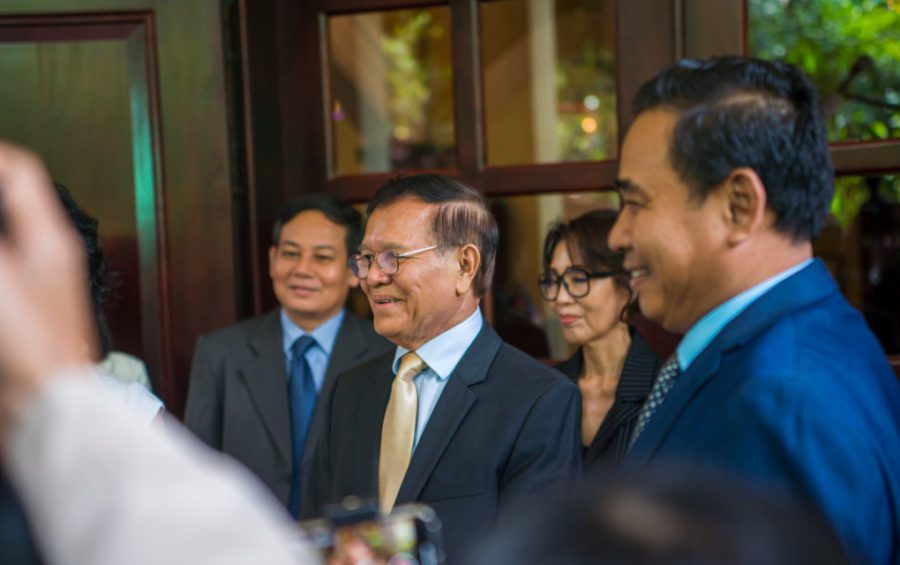Kem Sokha’s lawyers walked out of his trial hearing before it finished on Thursday after the judge interrupted them during a heated argument over access to evidence, which ended in the judge postponing the proceedings for two weeks.
Sokha, the leader of the banned opposition CNRP, is accused of conspiring with a foreign power to overthrow the Cambodian government. He was arrested in 2017, jailed for a year and later released to de facto house arrest.
The politician faces up to 30 years in jail if convicted.
During the tenth day of trial hearings, which started in mid-January, presiding judge Koy Sao suspended next week’s proceedings due to the lawyers’ exit and dismissed their actions inside the courtroom as disrespectful.
“When the documents have been brought for verification, they turn to walk out and this is rude behavior,” Sao said.
He warned Sokha that his lawyers had made a grave mistake by walking out, and that he would take legal action if they continued to delay the proceedings.
Sao said if he wished, Sokha could seek new lawyers before the trial would resume on February 26.
The disagreement between the judge and defense lawyers started Thursday morning over a joint statement from 2012 announcing that Sokha’s former Human Rights Party and the more popular opposition Sam Rainsy Party would merge to create the now-dissolved CNRP.
The statement seen by VOD notes that the CNRP will encourage a close relationship between top officials and commune councilors, and a nonviolent, democratic election. It also urges the Cambodian government to stop using the judicial system to suppress political freedom.
The defense lawyers raised concerns over the document because they did not see a seal in the top right corner, indicating that the document had been officially introduced as evidence in the court.
Sokha’s lawyers requested the judge verify that the document being discussed by the prosecutor was the same as the original document to prove that it was included in the original case file.
Deputy prosecutor Plang Sophal said the joint statement was already in the case file, and that verifying this document against the original would just delay the case further. He said that the defense team was responsible for finding the evidence presented in the courtroom.
“Who is going to take responsibility?” Sophal asked. “Not the deputy prosecutor, not the panel of judges, but it is the defense lawyers themselves who must take responsibility.”
Judge Sao allowed for the document to be verified, calling the court clerk to find the original, but the discussion remained tense.
During the debate, Sao said that the court did not have original copies of the document at the moment because an investigating judge was using it for a separate inquiry, though Sao did not say what the other investigation was about.
When defense lawyer Meng Sopheary tried to raise another point, Sao interrupted her, saying he would not listen to her comments.
The defense lawyers and presiding judge continuously interrupted each other until consulting judge Seng Leang asked Sopheary if she knew the rules of the court.
“Are you the presiding judge or are we?” Leang said.
At this point, defense lawyer Ang Udom tried to make another comment but Sao stopped him.
“Mr. Udom, sit down. You are the one who causes a lot of trouble,” he said.
Sao then banged his gavel on the podium until the argument ended, and Sopheary subsequently asked to leave.
“I’m asking to leave now because you don’t listen to the few words from me. I have my reasons,” she said.
Sao allowed her and the rest of the defense team to leave, however, he warned that he would take serious actions against what he deemed bad behavior in the courtroom.
“I will probably reduce the number of times I compromise, and if any party violates the law or has any improper behavior, the panel judge will take action in accordance with the law,” he said.
Speaking to VOD after the hearing on Thursday, Sopheary said she walked out because the presiding judge did not allow defense lawyers to explain that they were missing key pieces of evidence.
The joint statement under discussion was not the only piece of evidence that she and the defense team were missing, she said. Sopheary said that she believed the defense counsel had not seen more than 1,000 documents, according to the pieces of evidence numbered by the court.
“It is not a rude attitude,” she said. “It is the use of our rights. We want to express ourselves, and we lost the right of expression and we were banned [from speaking], so we can not stay anymore.”
She said she didn’t think that her decision to walk out would impact the case against Sokha, and added that she planned to attend the next scheduled hearing on February 26.












